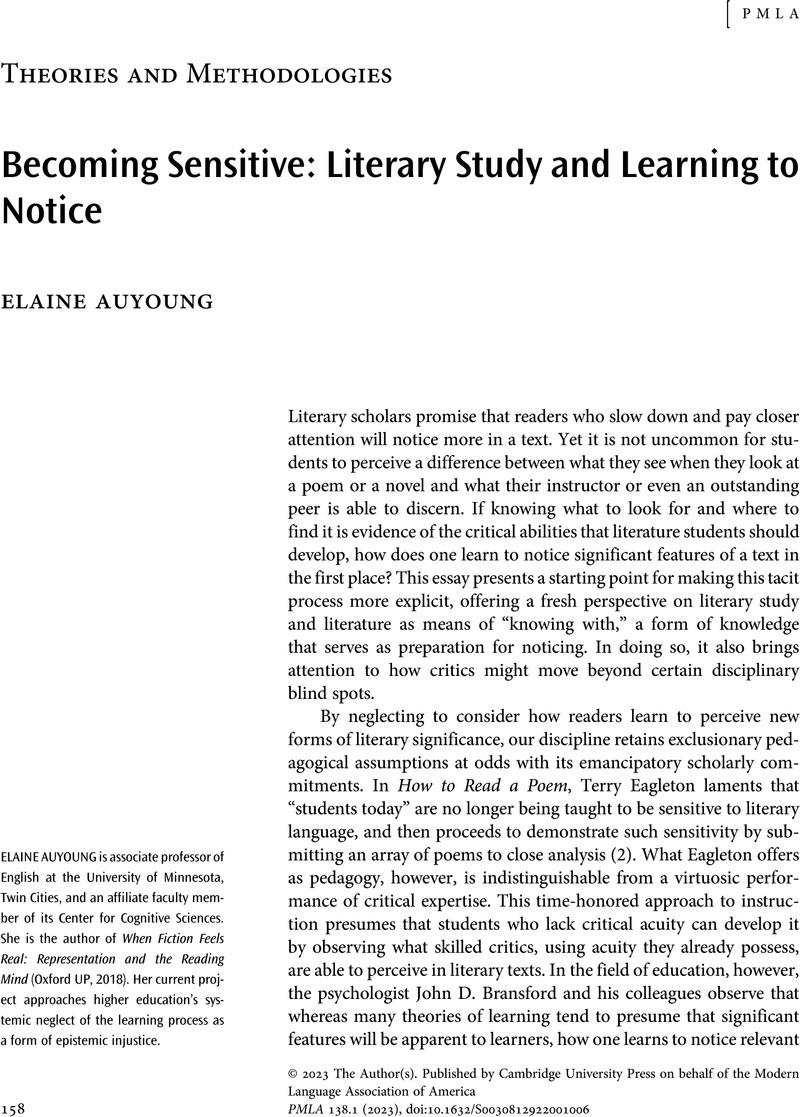No CrossRef data available.
Article contents
Becoming Sensitive: Literary Study and Learning to Notice
Published online by Cambridge University Press: 07 March 2023
Abstract
An abstract is not available for this content so a preview has been provided. Please use the Get access link above for information on how to access this content.

- Type
- Theories and Methodologies
- Information
- Copyright
- Copyright © 2023 The Author(s). Published by Cambridge University Press on behalf of the Modern Language Association of America
References
Works Cited
Atherton, Carol. Defining Literary Criticism: Scholarship, Authority and the Possession of Literary Knowledge, 1880–2002. Palgrave Macmillan, 2005.CrossRefGoogle Scholar
Auyoung, Elaine. When Fiction Feels Real: Representation and the Reading Mind. Oxford UP, 2018.CrossRefGoogle Scholar
Ben-Yishai, Ayelet. “Through English, Densely: Partitions, Complicity, and the Anglophone Classroom.” Representations, vol. 155, 2021, pp. 139–52.CrossRefGoogle Scholar
Bransford, John D., and Schwartz, Daniel L.. “Rethinking Transfer: A Simple Proposal with Multiple Implications.” Review of Research in Education, vol. 24, 1999, pp. 61–100.Google Scholar
Bransford, John D., et al. “New Approaches to Instruction: Because Wisdom Can't Be Told.” Similarity and Analogical Reasoning, edited by Vosniadou, Stella and Ortony, Andrew, Cambridge UP, 1989, pp. 470–97.CrossRefGoogle Scholar
Broudy, H. S. “Types of Knowledge and Purposes of Education.” Schooling and the Acquisition of Knowledge, edited by Anderson, Richard C. et al. , Erlbaum, 1977, pp. 1–17.Google Scholar
Buurma, Rachel Sagner, and Heffernan, Laura. The Teaching Archive: A New History for Literary Study. U of Chicago P, 2020.CrossRefGoogle Scholar
Gibson, Eleanor J. “Perceptual Learning.” Annual Review of Psychology, vol. 14, 1963, pp. 29–56.CrossRefGoogle ScholarPubMed
Guillory, John. “Literary Study and the Modern System of the Disciplines.” Disciplinarity at the Fin de Siècle, edited by Anderson, Amanda and Valente, Joseph, Princeton UP, 2002, pp. 19–43.CrossRefGoogle Scholar
Hume, David. “Of the Standard of Taste.” Four Dissertations, Millar, A., 1757, pp. 203–40.Google Scholar
Jameson, Fredric. “The Realist Floor-Plan.” On Signs, edited by Blonsky, Marshall, Johns Hopkins UP, 1985, pp. 373–83.Google Scholar
Kellman, Philip J. “Perceptual Learning.” Stevens’ Handbook of Experimental Psychology: Learning, Motivation, and Emotion, edited by Gallistel, Randy, 3rd ed., Wiley, 2002, pp. 259–99.Google Scholar
Kramnick, Jonathan. “Criticism and Truth.” Critical Inquiry, vol. 47, 2021, pp. 218–40.CrossRefGoogle Scholar
Lagemann, Ellen Condliffe. An Elusive Science: The Troubling History of Education Research. U of Chicago P, 2000.Google Scholar
Lynch, Deidre. “The Love of Literature.” Oxford Research Encyclopedia of Literature, Oxford UP, 28 Sept. 2020, https://doi.org/10.1093/acrefore/9780190201098.013.1033.Google Scholar
Mehta, Jal. The Allure of Order: High Hopes, Dashed Expectations, and the Troubled Quest to Remake American Schooling. Oxford UP, 2013.CrossRefGoogle Scholar
National Research Council. How People Learn: Brain, Mind, Experience, and School. Edited by Bransford, John D. et al. , National Academy Press, 2000.Google Scholar
North, Joseph. Literary Criticism: A Concise Political History. Harvard UP, 2017.CrossRefGoogle Scholar
Poulin, Michael J. “To Help or Not to Help: Goal Commitment and the Goodness of Compassion.” The Oxford Handbook of Compassion Science, edited by Seppälä, Emma M. et al. , Oxford UP, 2017, pp. 353–67.Google Scholar
Rauthmann, John F., et al. , editors. The Oxford Handbook of Psychological Situations. Oxford UP, 2020.CrossRefGoogle Scholar
Schultz, P. Wesley, and Kaiser, Florian G.. “Promoting Pro-Environmental Behavior.” The Oxford Handbook of Environmental and Conservation Psychology, edited by Clayton, Susan D., Oxford UP, 2012, pp. 556–80.CrossRefGoogle Scholar
Schwarzer, Ralf. “Health Behavior Change.” The Oxford Handbook of Health Psychology, edited by Friedman, Howard S., Oxford UP, 2011, pp. 591–611.Google Scholar
Whitehurst, Grover J., and Lonigan, Christopher J.. “Child Development and Emergent Literacy.” Child Development, vol. 69, 1998, pp. 848–72.CrossRefGoogle ScholarPubMed
Zimmerman, Jonathan. The Amateur Hour: A History of College Teaching in America. Johns Hopkins UP, 2020.CrossRefGoogle Scholar




